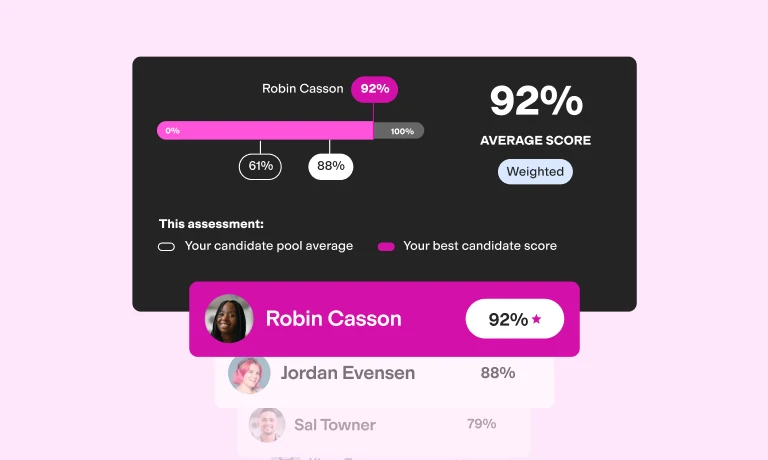In the workplace, critical thinking can be as important as technical abilities. Organizations striving for adaptability and innovation need employees who can analyze information, make sound decisions, and solve complex problems.
Understanding the critical thinking abilities of your current team members and job candidates can be difficult. Plus, many companies don’t know how to measure – or cultivate – critical thinking skills in the workplace.
In this article, we discuss what critical thinking is and why it’s an important skill in the workplace. We also explore ways you can assess and improve the critical thinking skills of your current team, plus ways to test critical thinking during hiring.
Table of contents
- What is critical thinking?
- Why you should measure and develop your team’s critical thinking skills
- How to measure critical thinking skills in the workplace
- How to develop critical thinking within your team
- How to find and test the best candidates with critical thinking skills
- Measure critical thinking skills more effectively with TestGorilla
What is critical thinking?
Critical thinking is the ability to take in, examine, and use information in a thoughtful and systematic way. It involves assessing facts, arguments, or situations objectively and actively. It also entails considering different perspectives and using reasoning skills to make informed and logical decisions.
Critical thinking encourages individuals to question assumptions, challenge beliefs, and explore the underlying evidence. It supports adaptability by enabling individuals to tweak their plans based on careful thinking.
Key components of critical thinking include the following skills:
Analysis: Breaking down complex information into parts to understand their relationships and implications.
Evaluation: Assessing the quality, relevance, and credibility of information, arguments, or solutions.
Synthesis: Taking information from multiple sources, making connections between information, and combining new information with prior knowledge to draw conclusions and make decisions.
Strategizing: Thinking about the future and determining actions for achieving goals.
Logical thinking: Using reasoning to think through problems thoroughly and objectively to make fair judgments.
Decision-making: Using all available information, seeking out new information, and assessing alternatives to make informed choices.
Problem solving: Creating innovative solutions to complex problems.
Reflection: Examining one's own thought processes, biases, and assumptions to enhance self-awareness and intellectual growth.
Creativity: Thinking creatively to generate new ideas, perspectives, or solutions.
Open-mindedness: Being open to different viewpoints, considering alternative perspectives, and being willing to revise beliefs because of new evidence.
Why you should measure and develop your team’s critical thinking skills
For some professions, critical thinking is a nonnegotiable competency needed to perform well. In positions like management, marketing, customer service, finance, and software development, effective decision-making and strong strategizing skills are vital.
Regardless of the role and industry, however, critical thinking plays a fundamental part in individual and organizational success.
Measuring critical thinking in the workplace can help you pinpoint skills gaps so you can implement strategies for improving these valuable skills within your team.
Developing critical thinking will help improve decision-making by empowering employees to approach challenges thoughtfully and analytically and determine out-of-the-box solutions.
Ultimately, critical thinkers can boost the success of your entire organization.
The best insights on HR and recruitment, delivered to your inbox.
Biweekly updates. No spam. Unsubscribe any time.
How to measure critical thinking skills in the workplace
Here are five methods you can use to understand your team’s critical thinking.
1. Performance reviews
When conducting performance reviews, assess how employees analyze situations, solve problems, and make decisions in their day-to-day tasks. Define how critical thinking plays a part in each employee’s role. For example, a project manager's position involves identifying potential risks, evaluating alternatives, and deciding the best course of action for each project’s success.
Note the critical thinking skills the employee demonstrates, along with areas for improvement. Keeping a detailed record of all past performance evaluations can help you measure the development of critical thinking skills over time.
2. Skills assessments
Use tests designed to evaluate critical thinking skills – such as the ability to organize information, infer conclusions, and make well-informed decisions.
For example, many of TestGorilla’s cognitive abilities skills tests can measure your existing workforce’s critical thinking skills. You can even use TestGorilla’s platform to create custom role-specific assessments. Repeating these tests – say at the beginning or end of the year – can help you measure your team’s skill development over time.
3. Problem-solving exercises
Create simulated scenarios that mimic workplace challenges. For example, you may ask an employee to imagine a particular situation with an angry customer. Have them walk you through their thought process and describe how they would solve the problem.
Observing how employees approach and handle these situations can provide insights into their critical thinking skills. Do this individually or in group settings.
4. Peer and manager feedback
Regularly collect feedback on each employee's critical thinking abilities from colleagues and supervisors. This can provide additional insights into how an individual's critical thinking skills impact team dynamics and outcomes.
For example, you could ask an employee’s manager questions like, “On a scale of 1-5, how open minded is [employee]?” or “Has [employee] come up with any creative solutions to a problem this quarter?”
You can go over peer and manager feedback with employees regularly – such as during your performance reviews.
5. Self-assessments
Encourage employees to self-reflect on their critical thinking skills. They can do this through self-assessment surveys or reflection exercises, which could ask questions like “On a scale of 1-5, how creative do you find yourself?” or “How did you approach a recent complex problem at work, and how would you approach that problem today if given another opportunity?” This will foster a sense of self-awareness and commitment to continuous improvement.
Maintain open lines of discussion with employees and help them understand how their perception of their skills aligns with their supervisors’.
How to develop critical thinking within your team
After you've measured your team's critical thinking using the above strategies, you'll have a good understanding of the critical thinking gaps that exist in your organization. Here are some ways you can coach your employees to sharpen the critical thinking abilities that need improvement.
Provide educational resources
Providing educational resources to employees can help them improve their critical thinking. Certain business self-help books can introduce them to critical thinking concepts in a business context. Online courses and articles focused on critical thinking can also help.
Find resources you think your employees will find most useful, and encourage them to use time during the workday to review them.
Teach employees better decision-making
Enhance critical thinking by teaching your employees to make better decisions. You can work through real-life situations with them to help them hone this skill.
For example, say you’ve tasked an employee with determining whether to invest in a new software for your business. You can teach them how to gather and analyze information about the software. Then, help them weigh the software’s pros and cons – for example, maybe it saves time and decreases workload but is expensive and takes time to implement. Have this employee consider other solutions, and help them make a final decision you both feel good about.
Build a growth culture
Build a growth culture by encouraging employees to pursue educational and professional development and providing support. More opportunities for growth will help keep your employees motivated and engaged. And as employees engage in continuous learning, they naturally expand their critical thinking abilities.
This culture of growth opportunities will also help you attract more candidates to your open roles.
Mentorship and feedback
Pairing employees with critically thinking mentors in the workplace can be a great way for mentees to develop their own skills. Mentors (employees with demonstrable critical thinking skills) can model how to gather and organize information to make better decisions. They can also provide feedback to their mentees to help them build self-awareness.
Games
Problem-solving games like puzzles, scavenger hunts, and improvisation games can be a fun way to foster connection among your team and improve critical thinking skills. For example, an improv exercise where team members must quickly respond to unpredictable scenarios in a mock client meeting requires quick thinking, adaptability, and creative problem solving. Exercises like these can be a less-intimidating yet effective way to put critical thinking into action.
Put critical thinking skills to the test
Measure how your skills development initiatives are going. The problem-solving exercises described above can help employees test their critical thinking abilities. You may even assign real, complex tasks as part of your employees’ workload to see how effectively they put their new skills into practice. Or, you can use skills assessments.
How to find and test the best candidates with critical thinking skills
In addition to building these skills within your existing team, you can also assess candidates for critical thinking skills during the hiring process to ensure you’re hiring critical thinkers for your open roles. Here’s how.
Talent assessments
You can use TestGorilla’s skills tests – like our Critical thinking test – to create a talent assessment that evaluates how your candidates process information and use it to make decisions. The Critical thinking test provides candidates with reasoning problems and tests key critical thinking skills, including the ability to understand cause-and-effect relationships.
Other tests to measure cognitive skills include:
Critical thinking interview questions
Skills tests are the best way to measure critical thinking skills fairly and consistently. After using skills tests to narrow down your candidate pool, you can ask critical thinking interview questions – like behavioral and situation questions – to get a better understanding of each candidate’s abilities.
Behavioral questions focus on a candidate's past experiences, asking them to share specific instances that they have demonstrated particular skills or behaviors.
An example of a behavioral question could be “Describe a time when you had to analyze complex information to make a crucial decision at work.” Answers to this question reveal how a candidate's thought process has guided their past decision-making and actions.
Situational questions present candidates with hypothetical scenarios relevant to the role.
Here’s an example: “How would you approach a situation where you’re given conflicting data on a project's progress and must determine next steps?" This type of question asks candidates to describe how they would handle these potential situations, providing insight into their problem-solving approach and adaptability in future circumstances.
Measure critical thinking skills more effectively with TestGorilla
Critical thinking is a valuable skill for any employee, and nurturing this ability within your team is entirely possible.
First, you can measure critical thinking skills in your existing workforce. From there, you can work on developing sub-skills that need improvement.
Further, you can focus on hiring critical thinkers for future roles by using talent assessments during your recruitment process.
TestGorilla’s test library includes hundreds of tests to help you test for various important skills – from critical thinking skills to technical abilities. To learn more, take a product tour – or sign up for free to get started right away.
You've scrolled this far
Why not try TestGorilla for free, and see what happens when you put skills first.


















